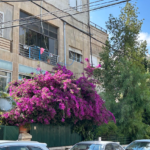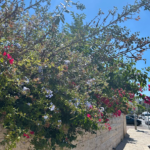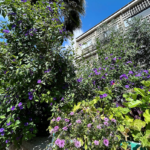The more things change, the more they remain the same: Plus ça change, plus c’est la même chose
Isaiah 2:3: Ki mi’tzion tetzeh Torah, oodvar Hashem mi Yerushalayim (Out of Zion will come forth the law, and the word of the Lord from Jerusalem)
Are Pro-Palestinian Activists Antisemitic?
As the Israel-Hamas conflict persists in Jerusalem, some have wondered how to differentiate between anti-Israel sentiments and antisemitism. Rabbi Yitzchak Schochet asks, “Why was Yishai Rebo, an Israeli singer who interprets biblical texts, performing for a Jewish audience met at a Harvard venue with vehement pro-Palestinian protests? This reveals how ‘Today, ‘Hating Israel’ is the correct way to hate Jews!'” This incident illustrates the contemporary fusion of antisemitism and anti-Israel protests and how animosity towards Israel is used as a socially acceptable facade for anti-Jewish sentiments.
What is Antisemitism?
In my view, antisemitism involves spreading false information about Jewish people for different reasons, whether it’s the ancient accusation of being responsible for the death of Jesus, the false belief in blood libels (i.e., that Jews use Christian children’s blood to bake their Passover matzah), or the stereotype of Jews controlling the media and finance. These misconceptions about Jews change over time, but the underlying prejudice stays the same.
Throughout history, antisemitism has manifested tragically, from medieval blood libels and expulsions to the horrors of the Holocaust. These myths and stereotypes have justified discrimination, violence, and even genocide against Jews in Germany. Understanding this history is crucial to recognizing how these prejudices persist in new forms today.
The Connection Between Antisemitism and Pro-Palestinian Activism
Pro-Palestinian discourse frequently centers on misinformation about Israel, often attributed to a more significant ideological conflict.
Nonie Darwish is a prominent figure whose personal story sheds light on the deep-rooted conflict and the ideological struggle surrounding Israel and Palestine. Born in Cairo and raised in Gaza, Darwish experienced firsthand the intense indoctrination against Israelis. Her father, an Egyptian military officer, further immersed her in an environment that viewed Israel as an adversary. Over time, Darwish began to question and eventually reject the anti-Israel rhetoric she was brought up with, recognizing it as propaganda. Her testimony highlights the pervasive misinformation that fuels the current conflict.
Her daughter, Shireen Said, continues this narrative. Their stories illustrate how deeply ingrained beliefs and misinformation can perpetuate hostilities. Their experiences underscore the importance of critical thinking and open dialogue in addressing and resolving longstanding conflicts rooted in ideological and cultural indoctrination.
Antisemitism and Pro-Palestinian Activism Clash at Universities
The recent Israeli-Hamas conflict has led to tensions on campuses, with reports of incidents perceived as antisemitic in connection with pro-Palestinian activism. This issue has been ongoing for many years, as evidenced by a 2014 YouTube video in which Jewish students on American campuses shared the antisemitism they experienced from pro-Palestinian groups. These incidents, including hate speech, vandalism, and social exclusion, are unfortunately not isolated to recent events; they demonstrate a longstanding challenge within academic environments.
The persistence of these incidents suggests that much work remains to ensure that campuses are safe and inclusive for all students, regardless of their political or religious affiliations. Universities must continue to develop, enforce, sustain, and strengthen policies that protect all students from any form of racism, including antisemitism, and foster an environment of respectful dialogue and mutual understanding.
Statistical Data
Data from organizations like the Anti-Defamation League (ADL) show a significant rise in antisemitic incidents globally, particularly during times of heightened conflict in the Middle East. These statistics underscore the need to comprehensively address this issue.
“Out of Zion Will Come Forth the Law”
To delve deeper into the underpinnings of this terrible virus of Jew-hatred called “antisemitism,” we turn to Judith Klitzner, a renowned Bible scholar. Klitzner points to the theme of sibling rivalry found in Genesis. She argues that the most significant challenge Jews and non-Jews face today is internal discord, which mirrors the familial strife depicted in biblical narratives. This perspective is crucial in understanding the broader context of antisemitism, which pits brother against brother in the current conflict. (*1)
Klitzner’s insights extend to examining how the biblical Pharaoh’s rhetoric enslaved the Jews despite Joseph’s pivotal role in Egypt’s survival. Similarly, she reflects on Isaac’s experiences with hostile neighbours, offering timeless lessons on dealing with animosity and prejudice.
Ways to Combat Antisemitism
The ongoing Israel-Hamas conflict and the surrounding pro-Palestinian activism reveal a complex web of historical, ideological, and theological threads. Antisemitism, often veiled as anti-Israel sentiment, continues to manifest in various forms. By revisiting our sacred texts and historical experiences, we can learn to address these age-old hatreds and foster a more truthful and harmonious dialogue. The Torah, from Jerusalem, still has much to teach us about confronting and overcoming the prejudices of our time.
Footnotes:
- Judith Klitzner, “Your Brother’s Blood is Calling Out,” Ikar, YouTube, April 29, 2023, based on Genesis 37:3-4 and Genesis 45:3-15.
“And Israel loved Joseph more than all his sons, because he was a son of his old age; and he made him a fine woolen coat. And his brothers saw that their father loved him more than all his brothers, so they hated him, and they could not speak with him peacefully.”1
“And Joseph said to his brothers, ‘I am Joseph. Is my father still alive?’ but his brothers could not answer him because they were startled by his presence. Then Joseph said to his brothers, ‘Please come closer to me,’ and they drew closer. And he said, ‘I am your brother Joseph, whom you sold into Egypt. For already two years of famine [have passed] in the midst of the land, and [for] another five years, there will be neither plowing nor harvest. And God sent me before you to make for you a remnant in the land, and to preserve [it] for you for a great deliverance. Hasten and go up to my father, and say to him, ‘So said your son, Joseph: “God has made me a lord over all the Egyptians. Come down to me, do not tarry. And you shall dwell in the land of Goshen, and you shall be near to me, you and your children and your grandchildren, and your flocks and your cattle and all that is yours. And I will sustain you there for there are still five years of famine lest you become impoverished, you and your household and all that is yours.” ‘And behold, your eyes see, as well as the eyes of my brother Benjamin, that it is my mouth speaking to you. And you shall tell my father [of] all my honor in Egypt and all that you have seen, and you shall hasten and bring my father down here.” And he fell on his brother Benjamin’s neck and wept, and Benjamin wept on his neck. And he kissed all his brothers and wept over them, and afterwards his brothers spoke with him.



